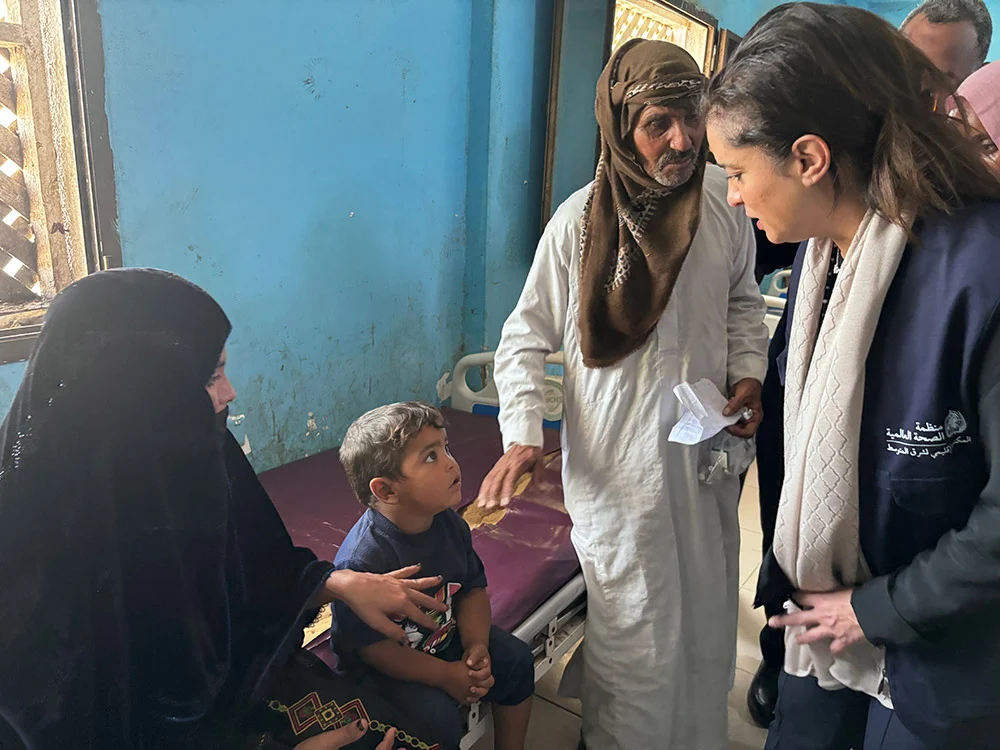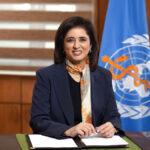
I have just returned from Sudan, my first mission to an emergency country in the WHO [World Health Organization] Eastern Mediterranean Region since I took office 5 weeks ago. I saw first-hand the devastation that decades of fragility, and nearly a year of brutal war, have wreaked on the country.
“We lost many things this year that we will never be able to get back,” one Sudanese woman told me.
I also learned about the immense challenges facing our humanitarian response as we work to reach all people in Sudan with life-saving aid.
Sudan is currently facing the world’s largest displacement crisis. Almost 8.5 million people (including almost 2 million who have fled to neighbouring countries) have been forcibly displaced and face uncertainty, vulnerability, and immense challenges.
Most internally displaced people are living among host communities, reflecting the sense of generosity and solidarity that the Sudanese people are known for. But this situation has resulted in soaring demands for food, safe water and sanitation, and access to health care. And attacks on health care during the escalation of hostilities have left more than 25% of all hospitals nonfunctional and the main national laboratory occupied by fighters.
In Port Sudan, health facilities are receiving between 2 and 4 times the number of patients they are used to managing. Strengthening the resilience of Sudan’s health system includes ensuring that spillover from neighbouring states can be absorbed without a negative impact on the host communities that also depend on these services.
I visited a hospital in a rural area, where I met passionate health workers who are committed to saving lives despite meagre resources. In this hospital and others, we need to ensure not only access to health services but also a minimal quality of care that includes proper infection prevention and control measures to protect both health workers and patients from harm.
Sudan has always been privileged to have a high-quality cadre of health professionals. As a paediatrician and infectious disease expert, many of my mentors during my medical education and career were from Sudan. Health workers, the backbone of Sudan’s health system, must be protected and gaps in key specializations must be addressed.
Food insecurity due to conflict and drought has led to increasing malnutrition among children. At a WHO-supported nutrition stabilization centre in Port Sudan, health staff told me that last year, the 16-bed centre sometimes had 3 or 4 children per bed.
WHO’s support to 42 stabilization centres across Sudan in 2023, to treat children with medical symptoms of severe acute malnutrition, has resulted in a 90% cure rate among all children admitted, well above the international standard of 75%.
Even before the escalation of war in April 2023, Sudan was facing 6 concurrent disease outbreaks. In September 2023, the country announced a cholera outbreak, which eventually spread to 12 states.
In the past few months alone, our efforts have resulted in a decline in the number of cases of cholera, dengue, and malaria. Over 500 surveillance officers trained by WHO across the country are working to ensure the early detection of these and other diseases.
In Port Sudan, which carried the burden of the cholera outbreak in the country at the end of 2023, I visited a WHO-supported cholera treatment centre. I was relieved to see no patients admitted, as the number of reported cases across the country continues to decline because of intensive interventions by national health authorities, WHO and partners, including a joint vaccination campaign that successfully reached 4.5 million people across the country.
Since the escalation of hostilities last April, millions of people across the country remain unreachable by humanitarian partners.
We are especially concerned about the situation in the Darfur states, where no direct humanitarian access has been possible for several months, and only limited aid is reaching people in these areas. Most health facilities have been looted, damaged, or destroyed. In West Darfur, the local health system has essentially ground to a halt.
This situation is testing our capacities as a humanitarian community. Working with neighbouring countries, Sudanese health authorities, and partners, we are exploring all options to reach all people in need, especially those living in inaccessible and hard-to-reach areas.
During my visit, I witnessed the arrival of the second of 2 flights carrying WHO supplies which landed in Port Sudan this week. Together, these 2 flights carried enough medicines and supplies to meet the needs of 750,000 people.
WHO currently has suboffices in 8 states across Sudan. We have consistently shown that when we are provided with sufficient access and resources, we achieve good health outcomes.
During my meetings with the Deputy Prime Minister and Minister of Health, I received reassurances that all efforts will be made to facilitate the scale-up of the health response throughout Sudan.
I also met the Humanitarian Coordinator of Sudan, and we agreed on the need for increased collaboration by all partners to address issues related to food insecurity, water and sanitation, and protection, all of which are interconnected and affect health outcomes.
Scaling up coordination and response efforts, however, requires commitment from all parties to lift access restrictions and put the health and well-being of the Sudanese people first, above all else. And it requires extensive support from the international community to provide resources and to make these cross-border and cross-line operations possible.
We cannot work towards our global, collective goal of universal health coverage when people like those in Sudan are left behind, without even the most basic level of services.
Beyond the immediate emergency response, we also need to ensure established and sustainable support for priority programmes in Sudan, including for malaria, dengue, maternal and child health care, and non-communicable diseases.
Health and well-being are at most peril during war. The root causes of this health crisis need to be addressed. Ultimately, peace is the only solution for a better future for Sudan, and the health and well-being of its people.
*WHO Regional Director for the Eastern Mediterranean. Report courtesy WHO Media:EMRO





